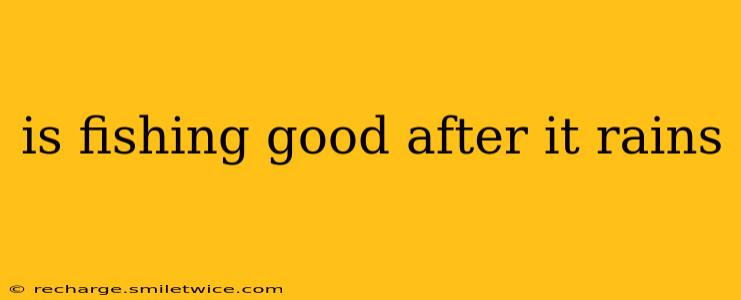The question of whether fishing is good after it rains is a complex one, with the answer heavily dependent on several factors. While a simple "yes" or "no" won't suffice, we can explore the nuances and provide you with a comprehensive understanding of how rain affects fishing. This guide will delve into the positive and negative impacts of rainfall on fishing success, helping you determine the best time to cast your line after a shower.
What Happens to Fish After a Rainstorm?
Rain significantly alters the aquatic environment, impacting water temperature, clarity, oxygen levels, and insect activity—all crucial factors influencing fish behavior.
-
Increased Water Levels & Flow: Heavy rain leads to swollen rivers and streams, increasing water flow and turbidity (cloudiness). This can flush out fish from their usual habitats and make them more difficult to locate. However, it also introduces new food sources into the water column.
-
Changes in Water Temperature: Depending on the air temperature and the intensity of the rain, the water temperature can either increase or decrease. A sudden drop in water temperature can make fish sluggish, while a slight increase can stimulate feeding activity.
-
Oxygen Levels: While heavy rains can initially decrease oxygen levels due to increased sediment, the subsequent runoff often carries oxygen-rich water, benefiting fish populations in the long run.
-
Altered Water Clarity: The most noticeable impact is often the reduction in water clarity. Muddy water makes it harder for fish to see, potentially affecting their feeding behavior, but it also provides excellent cover.
-
Increased Insect Activity: Rain often stimulates insect activity, leading to an influx of terrestrial insects into the water. These insects provide a feast for fish, making them more active and easier to catch.
Is Fishing Better Right After it Rains?
This depends largely on the intensity and duration of the rainfall. Immediately after a heavy downpour, the water will be muddy and the fish likely to be scattered and less active. However, after a moderate rain, especially a light shower, the fishing can be excellent as the increased insect activity attracts the fish to feed.
What Types of Fishing are Best After Rain?
Some fishing techniques are better suited to post-rain conditions:
-
Cloudy Water Fishing: Techniques that work well in murky water, such as using larger, more visible lures or bait, and fishing near cover where fish seek shelter, become highly effective.
-
Still Water Fishing: Ponds and lakes may see less dramatic changes compared to rivers and streams, making them potentially more productive fishing locations after rain.
Does the Type of Rain Matter?
Yes, the type and intensity of rainfall significantly impact fishing success.
-
Light Rain: A light drizzle often improves fishing conditions by increasing insect activity and slightly raising water levels, without significantly impacting water clarity.
-
Heavy Rain: Heavy downpours can result in murky water, making it more challenging to fish. The increased water flow can also push fish into deeper, more inaccessible areas.
-
Prolonged Rain: Extended periods of rainfall can significantly impact water quality and fish behavior, potentially making fishing unproductive.
How Long Should I Wait After it Rains to Go Fishing?
There's no magic number. Consider these factors:
-
Intensity of the Rain: After a light shower, you might be able to fish immediately. After a heavy downpour, you might need to wait several hours, even a day or two, depending on the size of the water body.
-
Water Clarity: Check the water clarity before heading out. If the water is still muddy, it's best to wait until it clears.
-
River Conditions: In rivers and streams, pay attention to the water flow. If the current is excessively strong and fast, wait until it subsides.
What Bait and Lures Work Best After Rain?
The best bait and lures to use after rain depend on water clarity and fish activity.
-
Muddy Water: Use larger, brightly colored lures that are easier to see in murky conditions. Strong-smelling baits, like worms or stinkbait, can also be effective.
-
Clear Water (after light rain): More subtle lures and natural-colored baits are appropriate once the water clears.
In conclusion, while rain can negatively impact fishing in the short term, it also presents opportunities for successful angling. By understanding the effects of rain on fish behavior and water conditions, you can improve your chances of catching fish even after a downpour. Remember to always prioritize safety and check water conditions before you head out.
